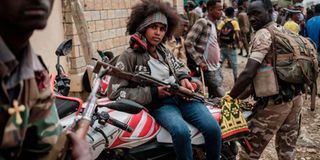Tigray conflict calls for African solutions for African challenges

Tigray Defence Forces monitor captive Ethiopian soldiers in Mekelle on July 2, 2021. Sudan on July 4, 2021 urged all conflicting parties in Ethiopia's Tigray region to stop fighting and sit at the negotiating table.
The maxim ‘African solutions for African challenges’ is a profound assertion of independence and responsibility. Its application to preventing and resolving violent conflicts in Africa is key to our independence and prosperity.
Kenya prioritises deploying this principle in the key forums responsible for protection of peace such as the United Nations Security Council and the African Union Peace and Security Council.
This we must do assiduously since more than 60 per cent of the business the UN Security Council undertakes is in Africa. The council’s engagement with the continent’s security challenges, lacking guidance by Africa-generated solutions, can be profoundly harmful. The history of its refusal to act to stop the genocide in Rwanda in 1994, and its decisions that led to the destruction of Libya, loom large.
It is, therefore, the responsibility of all Africans to generate and insist on African solutions to violent conflicts.
Forward-looking solution
The conflict in Ethiopia is the latest test of whether we can offer workable solutions. It is a full-blown crisis of a political, military and humanitarian character related, but not limited, to the Tigray region. The human suffering has been immense, and the escalating violence threatens to take on a protracted character.
A proactive, forward-looking solution was offered by African countries in the Security Council on July 2, during a meeting on the crisis in Tigray. The A3 Plus 1, as they are referred to in the Security Council, argued for unfettered humanitarian access and for the government’s unilateral ceasefire to be observed by all armed actors.
They noted the formidable suite of conflict resolution tools available in Africa’s peace and security architecture and recommended them to the government and people of Ethiopia. We have faced similar challenges to varying degrees; and know that the cleavages being weaponised in Ethiopia are shared throughout our region.
A key concern for Ethiopia is for its sovereignty to be respected by any foreign actors. It is crucial that all Ethiopians understand that Pan-Africanism, as reflected in the A3 Plus 1 stance, is sovereignty-enhancing. We argued for territorial integrity and political independence of Ethiopia, as well as the human security and democratic aspirations of its citizens. Africa’s experience teaches us that our independence can only be sustained when we stand together across borders.
Endanger sovereignty
That is why our leaders, at the highest level, and as reflected by our ambassadors to the AU and UN security councils, have sought to keep at bay external solutions that can fundamentally endanger Ethiopian sovereignty.
It is time now for us to openly urge the government and people of Ethiopia to face this moment and act boldly before it is too late. We will always stand with them but we also need them to reach out and make use of our goodwill and brotherliness. This is what needs to happen if we are to work together to bring Ethiopia back to being an exporter of peace that is at peace with itself.
There must be an immediate cessation of hostilities by all parties. The primary reason for this should be the government’s commitment to facilitating an inclusive, transparent, and genuine national dialogue. It will also enable unfettered humanitarian access into all the affected areas. There should be no expulsions of civilians. Instead, we urge a complete halt to human rights abuses.
Internally displaced people and refugees should be enabled to return to their homes. Farmers should be facilitated to plant their crops to avert famine.
Foreign forces in Ethiopia must also stand down and withdraw in a verifiable manner.
Financial pressure
Countries applying financial pressure on the government must reverse course to not create an economic catastrophe. Instead they should commit to work with Ethiopia and the region in facilitating national dialogue and putting in place economic relief packages that give the Ethiopian people hope.
A careful watch must be kept on terrorist groups such as al-Shabaab and their extremist fellow travellers who will be seeking to increase radicalisation and recruitment in these psychologically wrenching times in Ethiopia.
As a current member of both the AU and UN security councils, Kenya will leverage our knowledge of the region and good neighbourliness to ensure their decisions work best for Ethiopia. We urge Ethiopia to engage with the region knowing that its peace is Kenya's peace; it is Africa's peace.
Mr Kamau is the principal secretary, Ministry of Foreign Affairs. Dr Kimani is Kenya’s permanent representative to the UN





